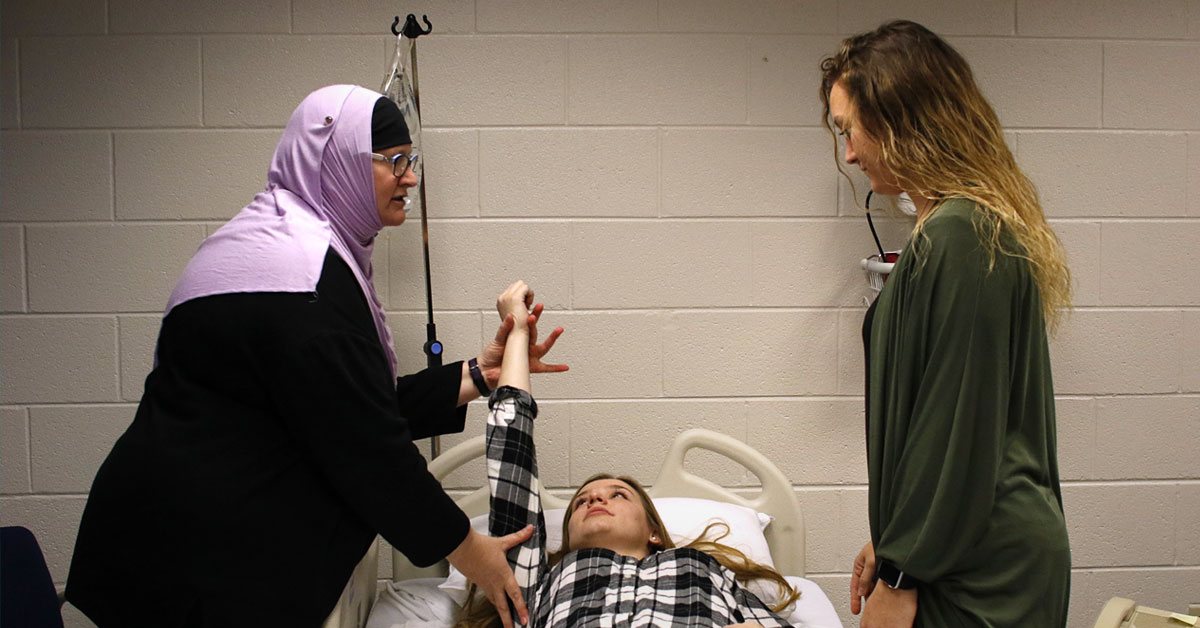Continuing Education Requirement for Occupational Therapists Insurance
Occupational Therapist Education Requirements: What You Need to Know
GRADUATE STUDIES | 4 MIN READ

At the heart of their work, occupational therapists help others. They assist patients who must adapt to or overcome the effects of injuries, illnesses, disabilities and more. They address the physical and psychological barriers that stand between these patients and a better quality of life.
It's no surprise that such a rewarding profession attracts so many people. If you're interested in following the career path of an occupational therapist (OT), you need to be familiar with the education requirements.
OTs must graduate from an accredited occupational therapy program, be licensed to practice and pass the National Board for Certification in Occupational Therapy (NBCOT) exam. This makes obtaining a master's degree a vital part of launching a career in the field.
The quest for that degree starts with a top-flight occupational therapy program, one that helps you build skills and knowledge while also preparing you for the all-important exams that allow you to become a licensed and certified practitioner. The key is find a graduate degree program that meets those requirements—and your needs.
Rising Demand for OTs
The occupational therapist education requirements are rigorous, but career prospects in the field are bright.
OT jobs are expected to grow by 24 percent between 2016 and 2026, according to U.S. Bureau of Labor Statistics data—an above-average rate. Bureau data also shows the median annual salary for an OT is above average at $83,200.
How Do I Become an OT?
The first step to becoming a licensed occupational therapist—beyond having a personal passion—is earning a bachelor's degree. Remember, a master's degree is required to become a licensed practitioner. The good news is many schools will consider applications from students from a variety of backgrounds and areas of study. The admission requirements of OT degree program applications are relatively similar to those of any health care graduate program: completing prerequisite coursework, taking the GRE exam and providing official transcripts or work experience.
More good news: You can finish a master's program in occupational therapy in as few as two years. Expect to encounter course subject matter such as:
- Mental health and learning challenges
- Functional anatomy and neuroscience
- Client interventions and research-based practice
- Acute and chronic physical conditions
To get the best occupational therapy education, students should look for institutions that are accredited and offer dynamic curricula. This means seeking out a program accredited by the American Occupational Therapy Association—as Elmhurst University's program is—that features service learning, field experience and collaborative research opportunities alongside coursework.
What is the NBCOT Exam?
Once you've earned your master's degree, the next step to becoming a licensed occupational therapist is to pass the NBCOT exam. Developed, administered and reviewed by the National Board for Certification in Occupational Therapy (NBCOT), the exam applies evidence-based standards to ensure the skill and knowledge of practicing occupational therapists.
- Read through this handbook for helpful information about the exam.
What Are Some Occupational Therapy Careers?
Upon becoming certified as an OT, you'll have a number of career choices available to you. Here are just a few of the work settings OTs can find employment in:
- Hospitals, regional health systems, community clinics and private practices
- Assisted living facilities
- Schools
- Skilled nursing facilities
- Home health
You will also discover that delivering quality care is just one aspect of an OT's job. Occupational therapists must holistically assess their clients' lives and assist them through their daily routines—work, leisure, eating, physical activity, sleep, etc.
You will develop skills similar to that of a coach—motivating, encouraging and engaging clients to achieve the best outcomes. Meanwhile, it's possible that you'll be working with a wide range of clientele coming from all walks of life. The role often requires interactions with family members as well. It's absolutely crucial to learn effective communication techniques and refine your "bedside manner" at the same time you are building a base of core knowledge.
Earn Your Master's from Elmhurst University
If you are interested in earning a graduate degree, consider the Master of Occupational Therapy (MOT) program offered at Elmhurst University. The program, which blends on-campus and online learning, can help you meet your occupational therapist education requirements and put you far along your path to certification and a fulfilling professional career.
Request information to learn more today!
Source: https://www.elmhurst.edu/blog/occupational-therapist-education-requirements/
0 Response to "Continuing Education Requirement for Occupational Therapists Insurance"
Publicar un comentario